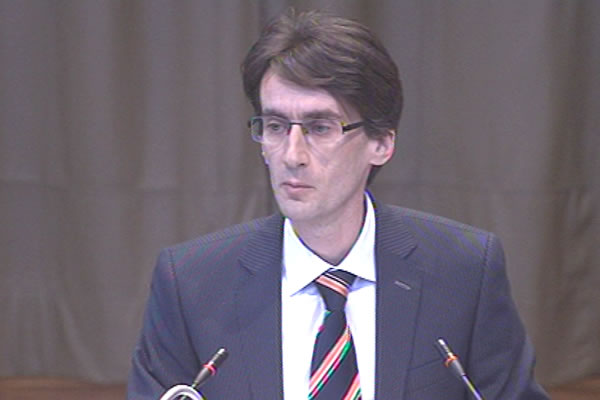Home
SERBIA: CROATIAN LEGAL TEAM'S CHILDISH GAMES, MANTRAS AND FAIRY TALES
At the International Court of Justice, the Serbian legal team responded to the allegations made last week by the Croatian lawyers in the second round of arguments. Croatia filed a suit against Belgrade for violations of the Convention on the Prevention and Punishment of the Crime of Genocide
 Sasa Obradovic, head of the Serbian legal team
Sasa Obradovic, head of the Serbian legal team In the second round of arguments in the case brought by Croatia against Serbia for alleged violations of the Convention on the Prevention and Punishment of the Crime of Genocide, Serbian team responded to the arguments presented by the Croatian team about the jurisdiction of the court over crimes committed before 27 April 1992, when the Federal Republic of Yugoslavia was formally constituted as a state.
The head of the Serbian legal team Sasa Obradovic first responded to the appeal made by his Croatian counterpart Vesna Crnic Grotic, to "base the reconciliation of the two states on historical facts". According to Obradovic, it is Croatia's intention to "demonize Serbs" by accusing them of being "genocide deniers", engaged in producing a "revisionist, false version of history" and "manipulating facts". Croatia is playing childish games, claiming that Serbia has admitted to crimes or accepted Croatian arguments every time the Serbian team say something that is favorable to Zagreb.
Obradovic then asked rhetorically what game Croatia was playing: at the beginning of the hearing, Croatia used "the claim that genocide is not a numbers game as a mantra", and then moved on to make claims about the destruction of the Croatian people as a whole, "starvation, beating, mutilation, castration... taking people to death camps in Serbia... just because they are Croats". That is not true, Obradovic said, adding that the unsigned statements the Croatian witnesses provided to the police about the atrocities in Western and Eastern Slavonia, Knin and Dalmatia were not admissible as evidence before Serbian and Croatian courts.
In a presentation about the Court's jurisdiction, Andreas Zimmerman, labelled Croatia's claims about the continuity of the application of international treaties as "fairytale". As he argued, before 27 April 1992, the Genocide Convention was applicable to the Socialist Federal Republic of Yugoslavia, and after that date, to the Federal republic of Yugoslavia and by extension to Serbia. Indeed, Croatia did not recognize Serbia's right to be considered as a contracting party to international conventions, Zimmerman noted, invoking several official Croatian documents from 1994. Serbia was bound by the rules of customary law throughout this period, Zimmerman stressed, but recalled that the International Court of Justice had jurisdiction over cases that involve the application of the Genocide Convention, not customary law. The fact that the Court lacks jurisdiction does not imply that the states are relieved of their obligations stemming from the application of international customary law. The Court is not the only mechanism that can force the states to prohibit genocide; indeed, the Convention is not the only instrument imposing the obligation to punish and prevent genocide, the German professor stressed.
As Zimmerman said, last week Croatia's representatives tried to "threaten" the judges by implying that if the highest world court were to apply the same standard of proof it applied in Bosnia and Herzegovina vs. Serbia case, it risked becoming "irrelevant". "Fear is a bad counsel"' Zimmerman warned.
As the hearing drew to a close, another member of the Serbian team, Wayne Jordash, began his presentation refuting the claim that the evidence admitted in the Tribunal's cases support Croatia's allegations about Belgrade's genocidal intent to "destroy in part or as a whole" the Croatian population. As he argued, the Tribunal convicted Milan Martic, Milan Babic and Mile Mrksic as individuals. These convictions and Babic's guilty plea do not say much about the role played by the Serbian leadership. The cases against the two chiefs of the Serbian State Security Service, Jovica Stanisic and Franko Simatovic, and against the former Chief of the VJ General Staff Momcilo Perisic, speak about the responsibility of the military and political top, Jordash said, adding that Stanisic and Simatovic were acquitted by the Trial Chamber, and Perisic was acquitted on appeal,
After barrister Jordash and Professor William Shabas complete their arguments about the Croatian suit, the Serbian team will tomorrow start the second round of arguments in support of Serbia's suit against Croatia, alleging genocide against the Krajina population during and after Operation Storm in the summer of 1995.Linked Reports
- Case : Croatia vs. Serbia
- 2014-03-20 CROATIA RESPONDS TO SERBIAN GENOCIDE DENIAL
- 2014-03-18 CROATIA DISMISSES COMPARISONS BETWEEN BRIONI AND WANNSEE
- 2014-03-14 ‘GENOCIDE WAS THE ONLY SOLUTION FOR KRAJINA SERB PROBLEM’
- 2014-03-28 SERBIA ARGUMENTS BEFORE INTERNATIONAL COURT OF JUSTICE COMPLETED
- 2014-04-01 CROATIA: ‘DISMISS SERBIAN GENOCIDE COUNTER-CLAIM
- 2015-01-22 JUDGMENT IN CROATIA VS. SERBIA CASE SLATED FOR 3 FEBRUARY 2015
